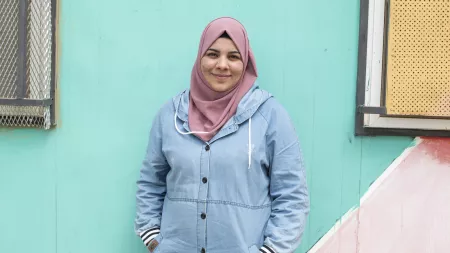Azraq Camp is currently home to approximately 43,000 Syrian refugees. The camp was opened on April 28, 2014, and is located 20 km west of al-Azraq in the desert area and 90 km from the Jordanian-Syrian border. On April 28, 2022, the camp will have already existed for eight long years. Eight years in which the refugees cannot return to their homeland.
Salam Abdel Raouf Hishmeh, 25, lived in Syria in Al Ghouta near the Damascus airport. When the Syrian war began, the airport was a recurring target, so her family feared for their safety. In 2012, they decided it was no longer safe. Salam fled across the border to Jordan with her parents and relatives. "We lost everything and couldn't take anything with us," Salam reports.
For a year, she lived with her family in Amman. The last time she went to school was in Syria. In 2013, at 17, she got married and lived with her husband in Amman for another six years. In 2015, her parents and siblings fled to Germany and found shelter in Frankfurt. With her husband she had four children. But when she was pregnant with her fourth child, her husband left her for another woman. "He gave up on me and my children. He threw me out of the house with nothing. Everything we owned, I left behind. He left me with nothing, not for me and not for my children," Salam said. She was able to stay with her brother for a while, where she gave birth to her daughter. The brother now also lives in Germany, in Berlin. The cost of living was too high for her in Amman, so she decided to move to Azraq Camp with her children in November 2019. "I had no other option. I had nowhere to go and had nothing," Salam recounts.
"The hut they gave me was completely empty. I didn't know anyone here in the camp and had to build new relationships with my neighbors," Salam reports. She found a job for six months with a local aid organization. With the money, she was able to cover her basic needs. "It's very difficult right now. I have to fetch water from the water station every day, which hurts my back a lot. The market is very far away. My children are young and I have to take them to school. These are all very long distances that I walk every day," Salam says.
At the moment, she has no job. "I feel very sad every time my children need something and I can't buy it for them." Salam is looking for a job. At CARE's community center, she has taken a sewing class and a beautification class and hopes those skills will help her find a job. She would like to learn more and to go back to school. At school in Syria, she was particularly good at science. "I would have liked to work in a lab or as a technician," Salam reports.
Meanwhile her ex-husband threatens her that he will take away the four children they have together if she can't take care of them. He does not support her, for example financially, although he earns well. "I'm so tense, he causes me strong emotional stress," Salam tells me.," Salam says.
Salam has twice tried to apply for asylum in Germany with the UN Refugee Agency because she would like to move in with her parents. She has not seen them for seven years. But they did not accept her papers there. Since she is an adult at the age of 25, her parents cannot simply bring her to them within the framework of family reunification. She has been told that only cases are accepted, for example, where there is an illness or some other case of hardship. "I'm looking for any way to phrase my application so that my difficult situation is clear," Salam said.
"I just hope my children get a better education. I try to teach them as much as I can, but the school here in the camp is not good." Salam's biggest dream remains reuniting with her parents and a better future for her children in Germany.
